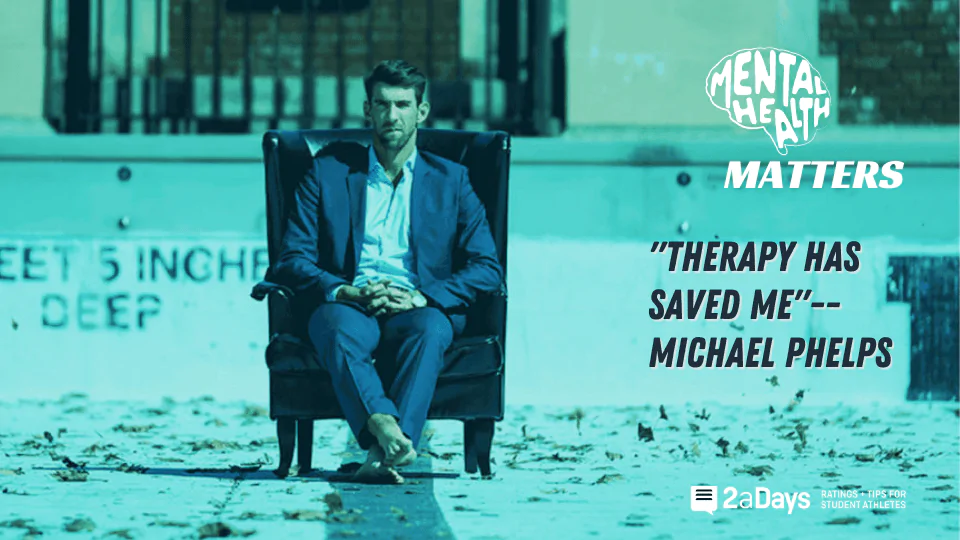Everybody knows who Michael Phelps is: he's the most decorated Olympian of all time, a 23-time Olympic gold medal winner, arguably the best swimmer ever, and even further perhaps, one of if not the greatest athletes of all time.
However, none of this makes Michael Phelps immune to mental health challenges.
Young Fame
Phelps was born into stardom at just 15 years old, when he became the youngest male swimmer in 68 years to qualify for the Olympics, in the Sydney 2000 Olympics. By the 2004 Olympics, Phelps had already been on the cover of some of the top magazines, including ESPN The Magazine, New York Times Magazine, and Sports Illustrated.
Phelps ended the 2004 Olympics with six Gold Medals. At just 19 years old, a star was officially born. It was a memorable Olympics for Phelps to say the least–however, it was also the first time he remembers his depression really setting in.
Related: Mental Health Matters: NBA Star Demar DeRozan's Mental Health Journey
“Really, after every Olympics I think I fell into a major state of depression,” Phelps said at a mental health conference in 2018. “I would say '04 was probably the first depression spell I went through.”
The Breaking Point
After the 2012 Olympics, Michael Phelps didn't even want to compete. He would spend days on end in bed, not eating or sleeping.
Two years later, in September 2014, Phelps was arrested for a DUI, while going 84 MPH in a 45 MPH zone, swerving in and out of lanes. This came with a 6-month ban from USA Swimming and 18 months of supervised probation.
Phelps got to the point where he was tired of all the negativity and didn't even want to be alive. He locked himself in his room for four days afterward.
That's also when he reached out for help.
Voice Heard
At the beginning treatment wasn't easy for Phelps. He was so used to compartmentalizing and internalizing what was going on.
However, with time that changed. For Phelps, therapy offered him relief–therapy gave him the chance to have his voice heard, and serve as somewhat of a cathartic mechanism. It's been much easier for Phelps to feel comfort and peace sharing stories and experiences that had been bottled up for up to 20 years.
Related: Stressed Out? How to Talk to Your Coach About Mental Health
In a Forbes article, Phelps was quick to talk about how much he benefited from therapy.
“I will say therapy has saved me, and it's helped me process life on dry land a bit easier.” said Phelps… I came out of my first session, and I was like, Wow that was awesome. The complete opposite of what I thought,” Phelps said.
Giving Back
Going through the ringer and the darkest moments one could possibly imagine, Phelps has made it his mission to help those struggling with mental health.
After retiring in 2016, Phelps moved from athletics to activism, continuing with that therapy which has helped him so much. Today he's continuing to stay active with mental health, running the Michael Phelps Foundation, who partners with other coalitions and whose mission is to promote mental and physical wellness, while also helping people chase their dreams.
“Saving a life is way more important than ever winning a gold medal,” said Phelps.
Phelps, who won 23 Olympic gold medals, is an incredible athlete. However, he doesn't want to be seen as a swimmer. He is a human being first, who just like anyone else may struggle with mental health.
Mental health can affect anyone at any given moment.
It's important to remember that at the end of the day, you are more than your sport, and more than an athlete. You are a human being.
Most importantly, it's okay not to be okay. Your story matters and so do you. Reaching out is a sign of strength, not weakness.
Just look at Michael Phelps.
Have an idea for a story or a question you need answered? Want to set up an interview with us? Email us at [email protected].
Image Credit: a.list daily
* Originally published on May 9, 2023, by Nicholas Nathanson







